digital nomad
description: those who use telecommunications technologies to earn a living and, more generally, conduct their life in a nomadic manner
45 results
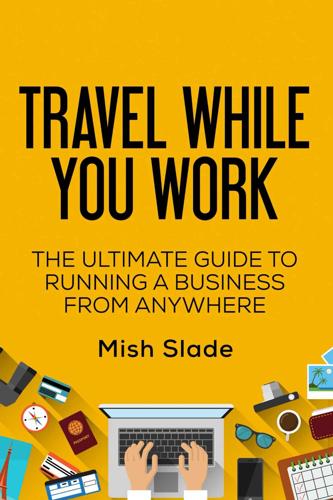
Travel While You Work: The Ultimate Guide to Running a Business From Anywhere
by
Mish Slade
Published 13 Aug 2015
This has actually been incredibly beneficial for our businesses: it's helped us to be more creative with our ideas and solutions to our problems. Other digital nomads don't move around quite so much: they might stay put in a city or country for months at a time. Some people even have a "base" where they spend a large chunk of the year, but will frequently take trips to other parts of the world. What makes them digital nomads is the fact that they make use of their freedom and flexibility to relocate whenever they want to – and that they're able to take their work with them. What your digital nomad lifestyle looks like is up to you, but if you plan on moving country or city too frequently, you'll struggle to get much done in the way of work.
…
Create Your Nomadtopia (www.worktravel.co/topia) is a fab Facebook group. (You need to ask for permission to join.) Follow other digital nomad blogs and – if you like the writers – let them know if you're in the same area as them. Twitter-stalk people and see where they are/where they're heading. If you have any digital nomad buddies already, ask them if they can introduce you (virtually) to others so that you can go on to meet them (in person) when you're both in the same place. Search for "digital nomad" on Meetup.com. Go to a coworking space and get talking to other people there. (Search Google for "coworking [name of city".
…
All of the freelance work I do is either for companies I worked for in the UK before I left or from recommendations. (I've actually met two of my clients either directly or indirectly through The Anywhereist Group – www.worktravel.co/anywhereist – which is an online community for digital nomads.) What did you do before you became a digital nomad? Programming is my profession, but I had only done a little freelancing. What steps did you take to transition towards becoming a digital nomad? (Or did it just happen naturally?) The main thing we did was save a load of money so we had a buffer if things went wrong. I also took on a freelance gig from peopleperhour.com but luckily I haven't needed to rely on work like that since.
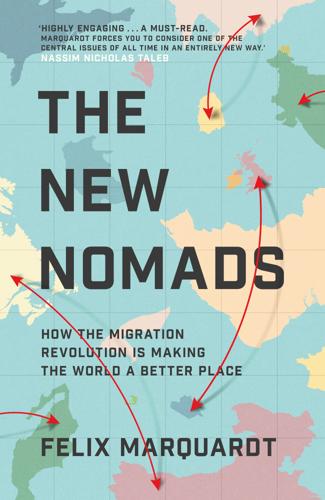
The New Nomads: How the Migration Revolution Is Making the World a Better Place
by
Felix Marquardt
Published 7 Jul 2021
Citing increased health risks and the difficulty of crossing borders, King predicts that the free-ranging digital nomad lifestyle will be on hold until a vaccine is available. Anecdotal evidence suggests that ‘the majority of digital nomads, in one way or another, have returned to their home country.’2 However, saying there is one ‘good’ way to be a migrant and suggesting that digital nomadism isn’t it doesn’t feel right to me. Much good can come of travelling around the world, seeing lots of different things, sampling all kinds of places and experiences. I think it makes more sense to look at the difference between Gonzalo’s digital nomadism, and his life in Barcelona, as being two phases in life.
…
Indeed, I was, for many years, a kind of digital nomad myself. Digital nomads are, inevitably, less fixed to the country of their birth. Most of them come from countries that are associated with wealth and status in our northern-gone-global consciousness. Few come from the (mostly Muslim) countries which issue green-coloured passports. There are for example very few Pakistani digital nomads because those passports will not allow for visa-free travel to many other countries. It perhaps comes as no surprise that other forms of privilege are essentials to be packed into the overhead compartment, too. Digital nomads tend to come from wealthy countries, and tend to be from wealthy backgrounds within those countries.
…
Wherever you are in the world, it’s almost impossible to stop someone holding a passport from a different country from leaving. In the age of Covid-19, dual citizenship means freedom. Typical digital nomad jobs might include graphic designers, programmers and writers. But really anything that can be done remotely can be a profession for a digital nomad. Indeed, the range of businesses at the coworking space in central London was as varied as the accents. Some wrote personal travel blogs (in fact a disproportionate number of them did). Travel blogging is the Ponzi scheme of digital nomadism: ‘Pay for my travels by reading/watching me give advice on how you can get paid for your travels.’ Others ran sophisticated business outfits like digital creative and advertising agencies, with remote workers spread across dozens of countries.
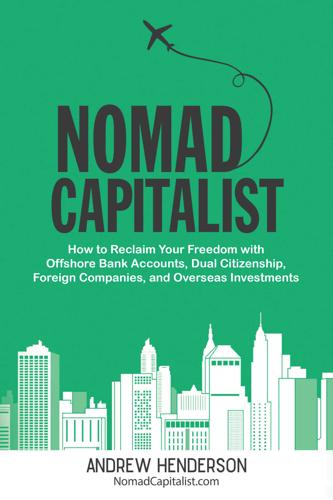
Nomad Capitalist: How to Reclaim Your Freedom With Offshore Bank Accounts, Dual Citizenship, Foreign Companies, and Overseas Investments
by
Andrew Henderson
Published 8 Apr 2018
Even as recently as the turn of this century, few would have predicted the rise of ‘digital nomads’ who live and work anywhere in the world, using their laptop to get business done from the beach. Back then, you slaved away in an office for fifty weeks a year only to look forward to a few summer weekends and two weeks’ vacation to Aruba or Cancun – or whatever place the travel agency was pitching on the back page of the local newspaper. Today, location independent business has exploded and will continue to do so. However, I predict that the next wave will be what I call Digital Nomad 2.0: businesses that are not only location independent, but government independent as well.
…
Foreign investment in Vietnam has always seemed to be a long game, so I would not expect overnight success, but Da Nang is on a lot of people’s radar. One of the most interesting trends in recent years has been the lifestyle business scene. Idyllic places like Bali – Ubud and Canggu in particular – have become digital nomad hubs, leading some to call the island ‘Silicon Bali.’ While much of the growth in Bali has been driven by digital nomads, the impact on Bali’s entrepreneur community is now well-formed and it is possible that Ubud could rise from a cheap lifestyle haven for bootstrappers into a startup hub in Indonesia. If the likes of Vietnam and Indonesia are not adventurous enough for you, Laos is the final frontier market I would recommend considering in Southeast Asia.
…
One other principle that has served me well in trusting is having an abundant lifestyle. For most traditional digital nomads, the key identifying point of their lifestyle choice can be summed up in one word: ‘cheap.’ An entire cottage industry has been built up around people who prefer living on $1,000 a month in Chiang Mai to working in the City of London for $100,000 a year. There is nothing wrong with that lifestyle, but it does condition you to think, “How can I get this done for cheap?” If you search on digital nomad forums or social media groups, you will quickly find people asking total strangers the most sensitive and complicated of questions, including many in the field of tax, all in the interest of avoiding a $500 phone call to an accountant.
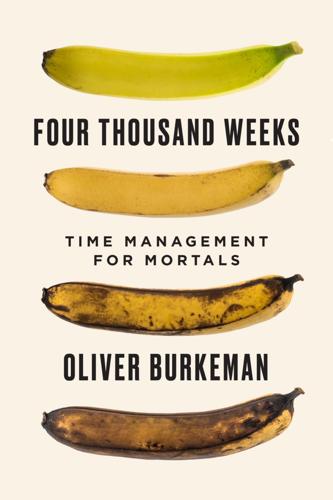
Four Thousand Weeks: Time Management for Mortals
by
Oliver Burkeman
Published 9 Aug 2021
The most extreme expression of this outlook is the modern lifestyle choice of becoming a “digital nomad”—someone who liberates herself from the rat race in order to travel the globe with her laptop, operating her internet business from a Guatemalan beach or Thai mountaintop, as her fancy dictates. But “digital nomad” is a misnomer—and an instructive one. Traditional nomads aren’t solitary wanderers who just happen to lack laptops; they’re intensely group-focused people who, if anything, have less personal freedom than members of settled tribes, since their survival depends on their working together successfully. And in their more candid moments, digital nomads will admit that the chief problem with their lifestyle is the acute loneliness.
…
The Loneliness of the Digital Nomad “I don’t have to take out the garbage”: All quotations from Mario Salcedo come from Lance Oppenheim, “The Happiest Guy in the World,” New York Times, May 1, 2018, available at www.nytimes.com/2018/05/01/opinion/cruise-caribbean-retirement.html. “A person with a flexible schedule and average resources”: Scott Adams, How to Fail at Almost Everything and Still Win Big: Kind of the Story of My Life (New York: Portfolio, 2013), 173. “Last year, I visited 17 countries”: Mark Manson, “The Dark Side of the Digital Nomad,” available at markmanson.net/digital-nomad. In 2013, a researcher from Uppsala in Sweden named: Terry Hartig et al., “Vacation, Collective Restoration, and Mental Health in a Population,” Society and Mental Health 3 (2013): 221–36.
…
Facing Finitude 4. Becoming a Better Procrastinator 5. The Watermelon Problem 6. The Intimate Interrupter Part II: Beyond Control 7. We Never Really Have Time 8. You Are Here 9. Rediscovering Rest 10. The Impatience Spiral 11. Staying on the Bus 12. The Loneliness of the Digital Nomad 13. Cosmic Insignificance Therapy 14. The Human Disease Afterword: Beyond Hope Appendix: Ten Tools for Embracing Your Finitude Notes Acknowledgments A Note About the Author Introduction: In the Long Run, We’re All Dead The average human lifespan is absurdly, terrifyingly, insultingly short.
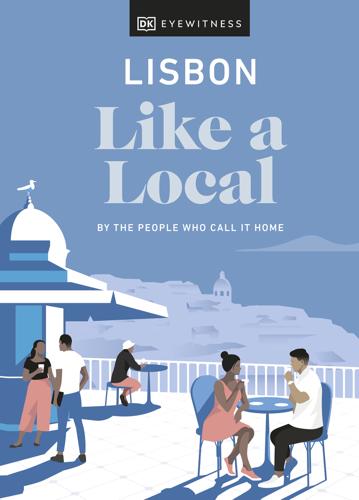
Lisbon Like a Local
by
DK
Work aside, Joana loves learning new crafts and trying out the latest craft brews (she seriously knows her beer). g Contents Lisbon WELCOME TO THE CITY You don’t have to have been born in Lisbon to be a Lisboeta. Portugal’s capital is home to generations of immigrants from its former empire, digital nomads lured by the laid-back lifestyle and folks who fell in love with Lisbon after just one life-changing visit. And it’s not hard to see why this stunner of a city has stolen so many hearts. Pastel-pretty houses with terracotta roofs tumble down to the sparkling Tejo and even the tightest of alleyways is adorned with azulejos and calçadas.
…
{map 6} Príncipe Real The heart of Lisbon’s LGBTQ+ scene, Príncipe Real is full of welcoming nightclubs, cool cocktail bars and fashion-forward boutiques. {map 3} Santos and Madragoa Brunch, speciality coffee and hip co-working spaces have made Santos and Madragoa the hood of choice for Lisbon’s digital nomads. {map 3} g Contents Lisbon ON THE MAP Whether you’re looking for your new favourite spot or want to check out what each part of Lisbon has to offer, our maps – along with handy map references throughout the book – have you covered. MAP 1 MAP 2 MAP 3 MAP 4 MAP 5 MAP 6 g Contents Lisbon ON THE MAP g Contents EAT Nothing brings Lisboetas together quite like food.
…
Here, Mouraria families and out-of-towners (often escorted by their Portuguese hosts) dissect their days over tasty, traditional dishes like lamb croquettes and duck rice. Solo, Pair, Crowd Whether it’s a table for one or a feast with the whole squad, this city has got your cravings covered. FLYING SOLO Working hard or hardly working Lisbon’s ever-growing community of digital nomads are big fans of farm-to-table concept Maria Food Hub, fuelling their days with bowls of eggs and stacked burgers. IN A PAIR Late-night date Drinks turned into dinner? Impress your date by topping off an evening out in Bairro Alto with Brazilian street food at Acarajé da Carol. Owner Carol is the perfect host, keeping your plates piled high and fruity cocktails topped up.
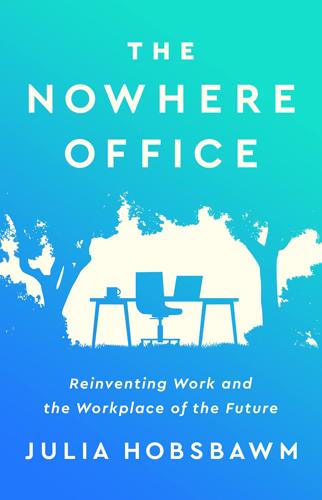
The Nowhere Office: Reinventing Work and the Workplace of the Future
by
Julia Hobsbawm
Published 11 Apr 2022
Although inevitably the numbers of passengers began to creep back up and down again following the up and down cycles of the coronavirus, commuting and business travel have become seen as largely expendable by many people. The biggest beneficiaries of the shift to placelessness are the true digital nomads, those who can up sticks and relocate anywhere there is broadband. Typically this means those without children or other caring responsibilities, i.e. Generation Z and anyone else who fits that bill. Digital nomads must also be digital natives for whom technology holds only promise, not a need for training. Again this tends to favour certain ages over others. Mobility has always represented freedom.
…
Ignoring hybrid is not an option, not least because by 2030 the majority of the office-based working community is likely to be freelance in the United States and therefore working flexibly, hybrid and in the Nowhere Office.36 The data is reflected globally: the UK and Brazil are the second and third largest freelance communities with Pakistan, India, Philippines and Bangladesh all seeing sharp rises; most of these freelancers will be digital nomads.37 Sir Martin Sorrell, who founded advertising behemoth WPP and now runs the growing global digital brand Media.Monks, gave me this view of the new working landscape: Apart from the destruction, which was terrible for people personally, all the pandemic did was just speed up change. San Francisco had problems because apartments were too pricey, a lot of homeless people.
…
Most of the team work remotely. I prefer it as it’s very flexible, especially as I am still studying at university full time. We use tools such as Slack to maintain communication and Trello for project management, as well as our own in-house portal. I work and study from home. As a Gen Zer, my ultimate goal is to be a digital nomad. Remote working gives me freedom to travel, explore as well as save time and money making trips to the office. Learners want the freedom to work remotely when it suits them, but also to enjoy the benefit of going into the office for social reasons and possibly for creature comforts too. Often the showers are better, the coffee is better than they have at home, and it is free.
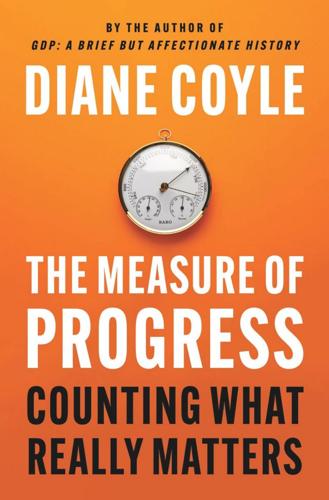
The Measure of Progress: Counting What Really Matters
by
Diane Coyle
Published 15 Apr 2025
Digitally Enabled Services When I sit on the shabby train from London to Cambridge early on Monday mornings, finishing my porridge before getting out my laptop, or in a coffee shop for an hour between meetings polishing off some 1. https://www.tradeconomics.com/position/ B or de r s 163 admin online like the crowd of others do as they hunch over tepid cappuccinos, it d oesn’t feel like living the enviable life of a digital nomad. The cluster of ICTs—powerful laptops, 5G and Wi-Fi, data compression, cloud computing infrastructure—means that many white-collar workers can work remotely. Many of us have done it a bit for years, but the pandemic has given rise to the nomad phenomenon. The Harvard Business Review even added its imprimatur with how-to articles, explaining the practical and legal issues (Hennigan 2023). Countries from Colombia to Czechia offer digital nomad visas. One 2023 survey claimed “a stunning 11%” of Americans describe themselves as digital nomads (albeit saying only a little about the survey methodology) (MBO Partners).
…
Journal of Economic Perspectives, 26(4): 43–56. https://doi.org/10.1257/jep.26.4.43 Heggeness, M. (2020). Estimating the immediate impact of the COVID-19 shock on parental attachment to the labor market and the double bind of mothers. Review of Economics of the Household, 18(4), 1053–1078. Hennigan, R. (2023). How to become a digital nomad. Harvard Business Review. https://hbr.org /2023/02/how-to-become-a-digital-nomad Heys, R., Martin, J., and Mkandawire, W. (2019). GDP and welfare: A spectrum of opportunity (ESCoE Discussion Paper No. 2019-16). Economic Statistics Centre of Excellence. Hicks, J. R. (1940). The valuation of the social income. Economica, 7(26), 105–124. https://doi .org/10.2307/2548691 Hicks, J. (1974).
…
The enforced remote working in 2020–2022 clearly led to a step change in hybrid work (see Chapter 4). To the extent this means s ervice delivery across national boundaries, it has implications for interpreting trade statistics and understanding the role of services in global production networks. Digital nomadism is an individual version of trade in digitally delivered services that was already expanding (Figure 6.2) in Richard Baldwin’s third unbundling (Baldwin 2019). Baldwin’s third unbundling separates l abour services from the physical presence of the labourers. The IT services sector in India, particularly around Bangalore, is one example.

Uncanny Valley: A Memoir
by
Anna Wiener
Published 14 Jan 2020
Some had long, bad trips, screaming about God or for their mothers. Some slouched outside an old movie theater around the block, recently reincarnated as a modern commune catering to the digital-nomad set, petting their dogs and panhandling. A neighbor referred to them as trust-fund babies. “You can tell by their teeth who’s had orthodontia,” he said, rolling his eyes, as we retrieved our mail from adjacent boxes. I didn’t know whether he meant the homeless millennials or the digital nomads, and didn’t ask. At night, when I got home, it felt almost like a different city. There were minimal traces of the ecosystem. San Francisco’s micro-neighborhoods were committed to well-worn urban identities: the Castro, a landing strip of innuendo-laden retail descending from a plaza where nudists drank coffee at bistro tables, their genitals stuffed into athletic socks, had been a crash course in a certain style of revisionist nostalgia.
…
Everyone was encouraged to work how, where, and when they worked best—whether that meant three in the morning in the San Francisco office, referred to as HQ, or from inside a hammock on Oahu. They were invited to bring their whole selves into work, and reminded to take their whole selves on vacation. Vacation, which was unlimited, was not tracked. Business hours did not exist. Half the workforce was remote, and digital nomadism was considered banal. The company was obsessed with developers, and the feeling was mutual. Users displayed a level of brand loyalty that bordered on fanaticism. They tattooed the mascot onto their bodies and sent photos to Support, the skin raw and red, the ink still fresh. The web shop sold enough swag—branded clothing, stickers, barware, toys, infant onesies—that it could have been an independent business.
…
The city was overflowing with new businesses giving new money the hard sell: a store full of minimalist tea kettles; a champagne bar serving caviar on shrimp chips; a members-only coworking clubhouse with boutique exercise classes in a eucalyptus-scented gym. A Ping-Pong club with truffle fries. A shop hawking pencil cases and bento boxes to digital nomads. Gentle-on-the-joints fitness studios: simulated cycling, simulated surfing. Sometimes, reasoning from first principles was a long and tedious process of returning to the original format. E-commerce sites that hadn’t already burned through their venture funding began opening brick-and-mortar flagships—in-person retail, the first-principles approach revealed, was a smart platform for consumer engagement.
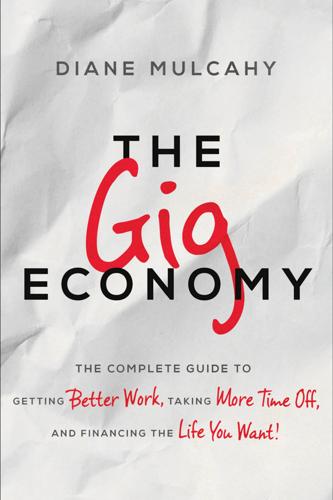
The Gig Economy: The Complete Guide to Getting Better Work, Taking More Time Off, and Financing the Life You Want
by
Diane Mulcahy
Published 8 Nov 2016
His research results suggest that organizing a life around our intrinsic values is the best way to increase our sense of well-being.5 The emergence of “digital nomads” is one example of this new, less-materialistic version of success. Digital nomads use technology to work, live, play, and travel when they want, from where they want. Freed from commuting, cubicles, the suburbs, and the status quo, they build geographically flexible lives around the places they want to be. It’s the antithesis of the traditional life centered on an office building, a mortgage, and a commute between the two. Unconcerned with what “everyone” thinks they “should” do, digital nomads are creating lives defined by their own version of success and working according to their own rules.
…
Manager schedules car payments cash flow, negative categorizing workers, eliminating Center for a New American Dream survey certifications Certified Financial Planner (CFP) Board checkbook diagnostic exercise Christakis, Nicholas Christensen, Clayton Clark, Dorie Reinventing You Stand Out cognitive biases cognitive resources collective bargaining, by contractors college graduates, unemployment and underemployment comfort zone Comment step in speaking in writing commitment dropping or reducing exit strategy from connecting without networking inbound connecting offer and ask outbound connecting consulting pricing strategy Consumer Federation of America contractors autonomy of collective bargaining by eliminating category vs. employees pricing strategy savings plans contracts corporate ladder corporate time suck costs of full-time employees of home ownership Create step in speaking in writing credentials-based economy, vs. skill-based Curate step in speaking in writing curated groups daily work schedule Dash exercise debt from education perspectives on decisions, either/or vs. and deferred life plan delegating denial, job security and Department of Labor (DoL) dependent contractor Dickson, Peter digital nomads directors and officers (D&O) insurance disability insurance disability issues, leaving work involuntarily diversifying expertise and portfolio of gigs risk of excess Doodle “double opt-in,” for introductions downsizing dream job Eagleman, David earned income education accessing debt from elevator pitch Ellis, Linda, “The Dash” Employee Mindset employee-in-a-job model employees advantages of being vs. contractors corporate benefits impact of Gig Economy learned helplessness about time prorated and portable benefits tax rate employers contribution retirement plans student loan repayment benefits tax compliance rate end dates, negotiating Entrepreneur Magazine equity in home ownership Ernst & Young eulogy virtues Ewing Marion Kauffman Foundation exercises calendar diagnostic checkbook diagnostic on priorities exit strategy creation facing fears and reducing risks finding gigs personal burn rate surrogation and success taking year off vision of success defined vision of success refined exit strategy creating for leaving job for reducing uncertainty for startup Expensify experimenting, gigs for expertise, diversification and failure, expecting and preparing for fear exercise for facing facing fee-only financial planner financial flexibility corporate perks in increasing with more income from low personal burn rate planning from savings and time off financial team, for independent workers finding gigs exercises Fitbit fixed costs income security from low flexibility debt and ownership impact see also financial flexibility Forbes 401(k) Fowler, James Fox, Jessica, Three Things You Need to Know About Rockets Framingham Heart Study, social connections Freelancer Freelancers Union FreshBooks full-time employees job disappearance as last resort fundraising Gabriel, Allison Gaignard, Jayson, Mastermind Dinners Gallup poll Generation X Gig Economy finding gigs of future good work vs. good job growth labor issues MBA course newness of pitch for outbound connect retirement to mix work and leisure rules for success size of Gilbert, Daniel giving time away Gladwell, Malcolm, Outliers Glassdoor, Employee Confidence Survey goal creep “good jobs,” future of The Good Jobs Strategy (Ton) government positions, layoffs Graham, Paul Granovetter, Mark Great Generation (65 and older) Groupon Gupta, Prerna Hanauer, Nick Handy, Charles happiness Harford, Tim Harvard Business Review Harvard Joint Center on Housing Studies Harvard Study of Adult Development health insurance health issues, leaving work involuntarily healthcare costs in retirement help from others Hill, Steven Raw Deal hindsight, power of home ownership vs. access to home impact on middle class myths of real costs Honest Dollar hosting, inbound connecting through Huffington, Arianna hyperbolic discounting “in-between space,” time off to create income security from low fixed costs from multiple income sources from opportunities pipeline from skills building supplemental income in retirement independent workers eligibility for retirement savings financial management savings plans self-insure for unemployment Individual 401(k) inflation information gathering interest, tax deduction for Internal Revenue Service on employee vs. contractor income tax forms, Schedule C interruptions, schedule free of introductions, asking for Intuit investment interval IRA job hunting job interview, time off explanation in job security jobbatical.com jobs, transition to work JP Morgan Chase Kasser, Tim, The High Price of Materialism Katz, Larry Kickstarter Kitces, Michael Kreider, Tim Krueger, Alan Krueger, Norris, Jr.
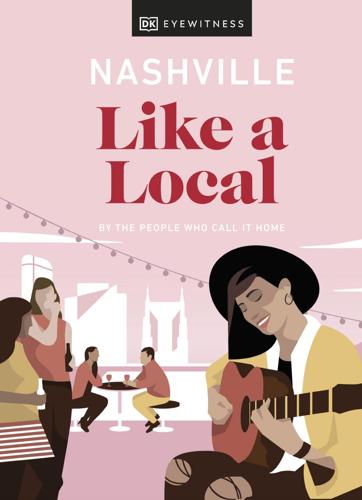
Nashville Like a Local: By the People Who Call It Home
by
Dk Eyewitness
Published 28 Sep 2021
also get discounts on coffee and gear. 79 076-079_LAL_Nashville.indd 79 06/08/2021 12:23 080-083_LAL_Nashville.indd 80 06/08/2021 12:23 C O F F E E S H O P S RETROGRADE Map 3; 1305 Dickerson Pike, East Nashville; ///couple.wanted.famous; www.retrogradecoffee.com This one’s a great little place for a bit of downtime. Bypass the tables of digital nomads, furiously typing at their laptops, en route to the counter and order an inventive latte (butterscotch and cardamom, you say?). If possible, get a seat by the storefront window – perfect for watching the world go by, or starting that new paperback. TEMPO Map 4; 2179 Nolensville Pike, South Nashville; ///fixed.soup.pure; www.temponashville.com When Texan percussionist Javier Solis arrived in Nashville he set about merging his affinity for quality cof ee with Tex-Mex breakfast fare.
…
Swing by the West Nashvil e store (the other is in Melrose) for a warm hello and hot espresso. 81 080-083_LAL_Nashville.indd 81 06/08/2021 12:23 C O F F E E S H O P S D R I N K RETROGRADE FROTHY MONKEY Map 3; 1305 Dickerson Pike, East Nashville; ///couple.wanted.famous; Map 4; 2509 12th Avenue South, 12 South; ///fuel.serves.cards; www.retrogradecoffee.com www.frothymonkey.com This one’s a great little place for a bit of downtime. Bypass the tables of On a tree-lined street in 12 South sits one of Nashville’s most well-digital nomads, furiously typing at their laptops, en route to the loved cof eehouses. Frothy Monkey is like a second home: stroller counter and order an inventive latte (butterscotch and cardamom, moms nurse rosemary honey lattes on the porch, groups gather you say?). If possible, get a seat by the storefront window – perfect for after church for breakfast and a brew, and students discuss politics watching the world go by, or starting that new paperback.
…
Cool events also transform the space into fantastical worlds from the movies and TV, like Stranger Things. PINEWOOD SOCIAL Map 1; 33 Peabody Street, Downtown; ///noble.translated.ripe; www.pinewoodsocial.com Ever stayed at one place, all day long? At Pinewood, it’s a given. Start your morning with cof ee and a breakfast bagel, which you’ll tuck into alongside digital nomads setting up shop at the library-like tables. 156 156-159_LAL_Nashville.indd 156 06/08/2021 12:23 N I G H T L I F E G A M E N I G H T After that, put your feet up by one of the outdoor dipping pools before the great and the good arrive; it’s around 5pm that you’ll see things Game Night pick up, as groups congregate for ping pong, bowling, and karaoke.

Perfection
by
Vincenzo Latronico
Published 18 Mar 2025
They would only be put up in the hotel during October and November, but they decided to leave their next move to fate, subletting their apartment for a whole six months. If they were enjoying themselves, they would stay in Lisbon. Otherwise they would see out winter on an island somewhere in Greece or Italy being digital nomads (an expression that never failed to irritate them, but even they could sense the envy beneath their contempt). They cleared out their apartment even more thoroughly than usual and packed second suitcases with more clothes to leave in a neighbor’s loft. This time they found tenants without the letting platform—a couple, both interaction designers newly arrived from Portland and willing to spend their company relocation package on a rent so expensive Anna and Tom felt almost guilty accepting it.
…
The Web Summit was about to take place, attracting people from all over the world, which in practice meant from the east and west coasts of the US, Berlin, and London. The hotel’s official opening would coincide with the first day of the summit, but it started accepting guests a couple of days before. One by one they arrived, pulling suitcases big enough to last them the duration of the special digital nomads package (Anna and Tom knew it well, having designed the promotional materials): five, ten, or twenty weeks at half board, with added extras like taxi vouchers, a series of organized aperitifs, flash talks, and mindfulness courses. On the first day of the summit the hotel threw a party for their new guests and the new website went live, marking the end of their contract.

Lonely Planet Egypt
by
Lonely Planet
. $$$ Seaweed Sushi Bar Impressively good sushi spot that wouldn’t be out of place in a town many times Dahab’s size. $$$ Dahab for Digital Nomads CONNECTING WITH THE LAPTOP BRIGADE Coastal Dahab has a boho allure unlike any other town in Egypt. The standard tourist hustle so pronounced elsewhere in the country fades significantly, and it’s easy for travellers to take a deep breath and relax into the groove. Its beachy location and laid-back attitude have made Dahab a draw for digital nomads and remote workers, who lug their laptops to the bayside cafes covered in colourful rugs and the glut of coffee shops serving European-style brews along the pedestrianised promenade.
…
A Week of Sun & Fun • Book a diving or snorkelling trip to Ras Mohammed National Park, an underwater wonderland of sea creatures and shipwrecks, leaving ample time to decompress and experience the park after hours at the Bedouin-operated camp of Bedawi. • Re-enter society with a flat white and wi-fi connection in Dahab, an oasis for divers and digital nomads. • Don a mask and peer into the depths of the Blue Hole, one of the world’s most infamous dive sites, and try not to get sucked into the laid-back lifestyle that frequently keeps travellers here much longer than they originally intended. Explore More • Even if you’re only in Sinai for a short time, every itinerary should include a trip to the mountains.
…
Year-round sunny skies, instant access to the beach, low prices, reasonable proximity to an international airport (in Sharm El Sheikh) and thrilling outdoor activities make the stock image of a remote worker on the beach a reality, as you sandwich meetings and spreadsheets between diving and rock-climbing lessons. Dahab has long had a New Age hippy vibe, but the uptick in digital nomads has brought out full-moon parties, yoga studios and all-vegan eateries. The one drawback in Dahab, as in Egypt generally, is the shockingly poor internet speeds, and the option to tether from your phone doesn’t always work with tourist SIM cards. Elite Residence, which rents comfortable kitchen-equipped flats a short walk from the beach and promenade, has perhaps the fastest internet we’ve encountered in Egypt, plus a gorgeous roof terrace with a brightly coloured Bedouin tent and views of the surrounding mountains.

Future Files: A Brief History of the Next 50 Years
by
Richard Watson
Published 1 Jan 2008
Drug testing in the US is widely endorsed by employees because it makes the workplace safer, and capturing emails for posterity can be useful if you want to defend yourself against a future lawsuit. No wonder paper use in our supposedly paperless offices has actually gone up. Digital nomads The third key driver of change at work is technology. Thanks to mobile phones, laptops and the internet, work is becoming less tied to a physical location. Instead we are becoming a tribe of digital nomads, working whenever and wherever we choose. This means that future employment contracts will have to change. Companies will need to realize that they are buying people for their ideas, not their time or physical presence, so annual contracts will be related to objectives met, not hours worked.
…
Indeed, by the year 2050 if this trend continues, most inner cities will be made up almost entirely of rich singles, wealthy families and gay couples with high disposable incomes and liberal political persuasions. Some might say they already are. The rural areas that still exist will be populated by rich hobby-farmers interspersed with downshifters, smartisans and digital nomads. But it’s not just the cities that are changing. In 1950, 80% of US households comprised the traditional husband, wife and one or more children. Now it’s under 50%. The rest are singles and samesex couples (increasingly with kids). There are also blended families — mother, father, plus two or more children from different relationships or marriages — and extended financial families, homes with more than one generation living under the same roof.
…
Only 59% of Americans believe what they read in the papers, compared to 80% Media and Entertainment 103 who did so in 1985. (Amazingly, 36% of US high school students also believe that the press should get government approval of news articles prior to publication, but that’s another story.) We are becoming digital nomads. We read, listen and watch what we want when we want. We no longer have the time (during the working week at least) to read newspapers, and we are shifting our eyes and ears to online information sources delivered via everything from cellphones to iPods. Almost 1.5 billion of the world’s population is now online and according to Zenith Optimedia, so is 8% of the world’s advertising.
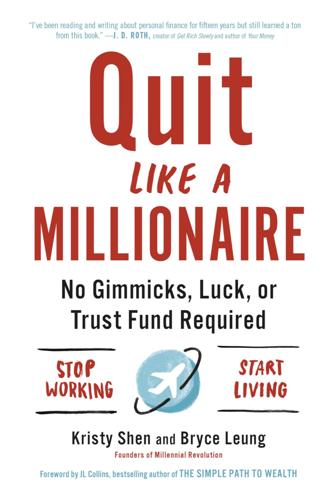
Quit Like a Millionaire: No Gimmicks, Luck, or Trust Fund Required
by
Kristy Shen
and
Bryce Leung
Published 8 Jul 2019
I blinked. “Come again?” Meet the world schoolers. The world is their classroom. While the catchy name can be traced back to around 2012, the practice itself seems to have originated in the early 2000s, when a community of alternative education advocates began comingling with the so-called digital nomad crowd—location-independent travelers who work remotely online. They began experimenting with ways to adapt nontraditional education methods to a nomadic lifestyle, and world schooling was born. This first wave of world-schooled kids has recently come of age, attracting media attention over the fact that rather than being weird, antisocial, and poorly adjusted people, these young adults are intelligent, sociable, entrepreneurial, and in many ways better developed than their traditionally schooled counterparts.
…
With a median salary of $62,175 a year and putting away $12,724 a year, you’d reach geographic arbitrage FI in: Year Starting Balance Annual Contribution Return (6%) Total 1 $0.00 $12,724.00 $0.00 $12,724.00 2 $12,724.00 $12,724.00 $763.44 $26,211.44 3 $26,211.44 $12,724.00 $1,572.69 $40,508.13 4 $40,508.13 $12,724.00 $2,430.49 $55,662.62 5 $55,662.62 $12,724.00 $3,339.76 $71,726.38 6 $71,726.38 $12,724.00 $4,303.58 $88,753.96 7 $88,753.96 $12,724.00 $5,325.24 $106,803.20 8 $106,803.20 $12,724.00 $6,408.19 $125,935.39 9 $125,935.39 $12,724.00 $7,556.12 $146,215.51 10 $146,215.51 $12,724.00 $8,772.93 $167,712.44 11 $167,712.44 $12,724.00 $10,062.75 $190,499.19 12 $190,499.19 $12,724.00 $11,429.95 $214,653.14 13 $214,653.14 $12,724.00 $12,879.19 $240,256.33 14 $240,256.33 $12,724.00 $14,415.38 $267,395.71 15 $267,395.71 $12,724.00 $16,043.74 $296,163.45 16 $296,163.45 $12,724.00 $17,769.81 $326,657.26 17 $326,657.26 $12,724.00 $19,599.44 $358,980.70 Sixteen and a half years! And if you’re willing to combine the ideas of geographic arbitrage and SideFIRE working as a digital nomad or teaching English overseas, by earning as little as $10,000 per year, you’d shorten your time even more, with a required portfolio of $13,560 − $10,000 = $3,560 × 25 = $89,000 within: Year Starting Balance Annual Contribution Return (6%) Total 1 $0.00 $12,724.00 $0.00 $12,724.00 2 $12,724.00 $12,724.00 $763.44 $26,211.44 3 $26,211.44 $12,724.00 $1,572.69 $40,508.13 4 $40,508.13 $12,724.00 $2,430.49 $55,662.62 5 $55,662.62 $12,724.00 $3,339.76 $71,726.38 6 $71,726.38 $12,724.00 $4,303.58 $88,753.96 Six years!
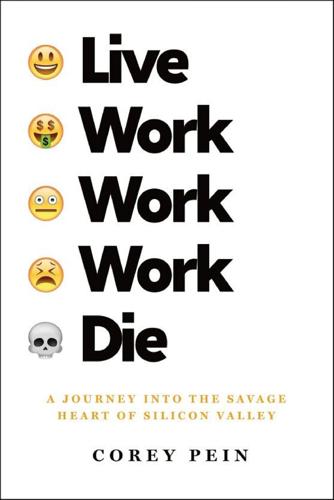
Live Work Work Work Die: A Journey Into the Savage Heart of Silicon Valley
by
Corey Pein
Published 23 Apr 2018
“We want to make every single government in the world compete for every single citizen,” the entrepreneur, Sten Tamkivi, said. I looked around. Tamkivi had blown minds with this nonsense. But his startup was so modest in scope that it made a mockery of his fantastically ambitious rhetoric about supplanting the global reign of nation-states. The startup, Teleport, supplied globetrotting “digital nomads” with personalized advice, such as how to find work in a new city and what neighborhoods to consider gentrifying. As he saw it, governments had a solemn obligation to compete for tech “talent” by offering favorable immigration policies and plentiful WiFi. It was a global race in which the position of the United States “if I may say, is falling sharply every year.”
…
Andreessen-Horowitz partner and Counsyl cofounder Balaji Srinivasan has proposed “cloud cities” and “cloud countries” of like-minded renunciates to be organized online. With $2.5 million in backing from his own VC fund—a conflict of interest not unheard of in Silicon Valley but egregious even by the tech industry’s incestuous standards—he cofounded a startup called Teleport to hasten such efforts by helping “digital nomads” find places abroad to live and work, with the ultimate aim of making citizenship a competition rather than a birthright. Srinivasan laid out the grand design in an essay for Wired. He predicted that “the internet will spur a wave of internal migrations as online communities begin gathering in person.”
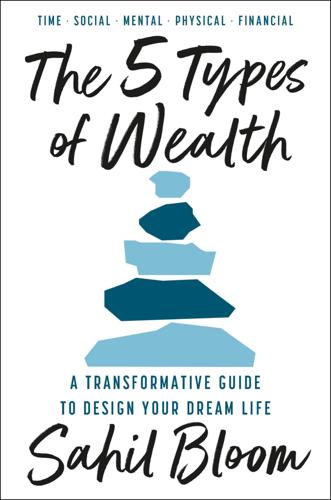
The 5 Types of Wealth: A Transformative Guide to Design Your Dream Life
by
Sahil Bloom
Published 4 Feb 2025
I had conversations with people from all walks of life. I sought them out. I flew to them. I sat with them. I listened to them. From recent college graduates to CEOs of Fortune 100 companies. From stay-at-home parents to those working multiple jobs to make ends meet. From professional athletes living out of suitcases to ski bums and digital nomads. From life coaches and spiritual guides to factory workers and auto mechanics. I became a student of the human experience. I spent hours with a man who was reeling from the recent loss of his wife, which had left him alone with their young daughter as he navigated the waves of grief; he shared his profound understanding of the greater depths of love accessible to us all.
…
According to an article in Fortune citing the survey, “The most common reason job-hoppers gave for wanting a return to their former employers was that they missed their old colleagues, with almost a third of respondents saying they missed their former teams.”[10] The loss of familiar, stable relationships outweighed the benefits in pay, geography, or flexibility. When you fail to measure and value your Social Wealth, you fail to consider it in your decisions. This raises an important point, particularly in the context of the popular narratives around geographic arbitrage, digital nomadic culture, tax optimization, and the like: What’s the point of all that financial optimization if you’re alone? How many people have sold their homes and moved to areas with lower taxes to save money only to realize that without their families and friends, they don’t feel at home?
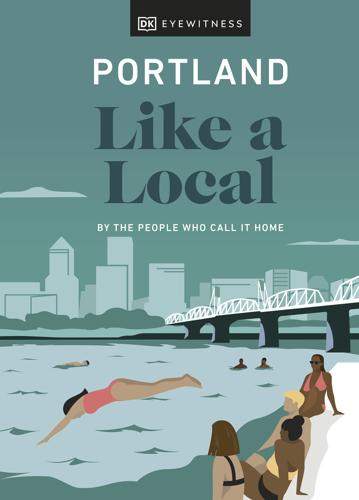
Portland Like a Local
by
DK
g Coffee Shops g Contents Google Map COAVA COFFEE ROASTERS Map 3; 1300 SE Grand Avenue, Buckman; ///shave.toxic.sober; www.coavacoffee.com Watch out Stumptown, there’s another roaster in town – and it takes its coffee seriously. Not only does Coava ethically source and carefully roast its beans, it also has a rigorous barista training program, so you know your coffee will be good no matter who’s making it. Its flagship store – a huge warehouse-style space in Buckman – is often jam-packed with tap-tapping digital nomads and novel-reading creatives. g Coffee Shops g Contents Google Map KOPI COFFEE HOUSE Map 3; 2327 E Burnside Street, Kerns; ///merit.exchanges.dose; www.kopicoffeeco.com This laid-back spot has a huge menu of Southeast Asian drinks. First-timers should try the addictive Indonesian cold brew with cardamom and cream, while the more adventurous can go for the Ube (purple potato) blossom latte.
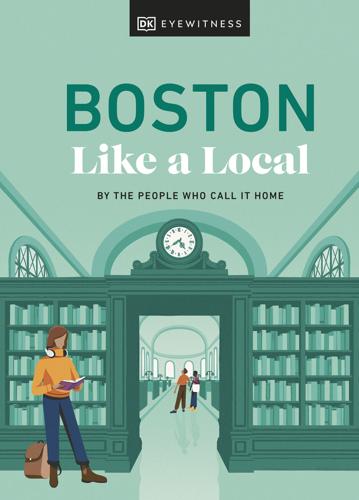
Boston Like a Local
by
Dk Eyewitness
This drool-worthy masterpiece of thinly sliced meat is perfection. g Sandos and Quick Bites g Contents Google Map PINK CARROT Map 1; 115 Salem Street, North End; ///finds.hosts.afford; www.pinkcarrotboston.com Sat among the carb-rich Italian joints of the North End, Pink Carrot is all about healthy, comforting food. Digital nomads post up here for the day with their laptops, sipping on expertly crafted coffee, while lunchtime joggers pop in for a fresh, filling salad. If you’re in a hurry, nab one of the stuffed sweet potatoes – especially the one topped with chocolate chips, banana slices, and a generous smear of peanut butter.
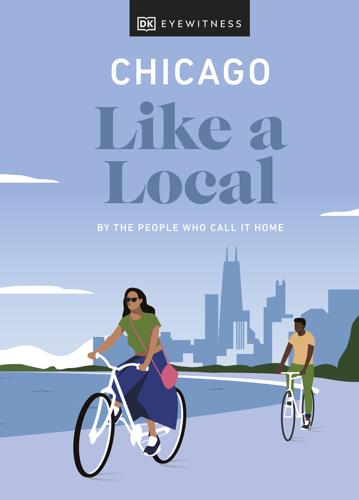
Chicago Like a Local
by
DK
g DRINK g Contents Coffee Shops METROPOLIS COFFEE COMPANY DARK MATTER COFFEE BRIDGEPORT COFFEEHOUSE METRIC PASSION HOUSE GASLIGHT COFFEE ROASTERS THE WORMHOLE INTELLIGENTSIA COFFEE g Coffee Shops g Contents Google Map METROPOLIS COFFEE COMPANY Map 6; 1039 West Granville Avenue, Edgewater; ///chefs.same.patio; www.metropoliscoffee.com Chilled vibes and good coffee greet digital nomads at Metropolis. This hip spot features all the freelancing essentials: laptop plugs, ample seating, and even a public printer. Make no mistake though, this isn’t an office. Friendly baristas greet you on arrival, a rotating display of local artwork lines the walls, and a chilled playlist keeps things easy.
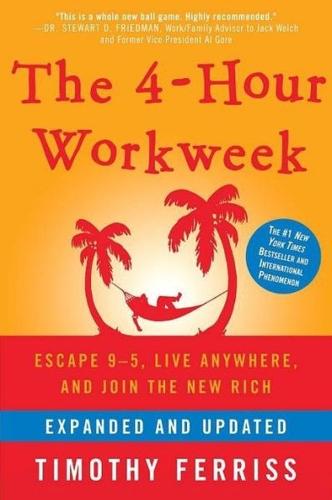
The 4-Hour Workweek: Escape 9-5, Live Anywhere, and Join the New Rich
by
Timothy Ferriss
Published 1 Jan 2007
My stress level has dropped significantly since leaving my old job and my quality of life has improved enormously. My family and friends in NYC still think I’m out of my mind, and I continue to fully agree with them…. —JEFF B. THE 4-HOUR FAMILY AND GLOBAL EDUCATION Tim, We moved to a totally digital nomadic life traveling the world as a family in 2006, so we discovered your book and ideas after we had begun and loved it! Our life has changed totally and is more fulfilling and much more simple. We are greener, leaner, healthier, happier, more connected. Other people thought we were absolutely nuts when we decided to do this in 2004/5, but now many of those same people think we are smart and psychic.
…
Problems finding a good school fit (despite having many award-winning excellent ones at our disposal) was probably the most specific moment (John Taylor Gatto says it best on why schools do not educate) that helped us to change as well as wanting more time together and forecasting the house/economy crash coming. I think more families will be taking mini-retirements and living slower, traveling digital nomadic lives. If you are away for months as a family, you need to be informed about all the wonderful educational opportunities which are actually richer than staying home (which few realize)! There are a TON of fantastic resources like Classroom 2.0 and many innovative educators online. My daughter just turned eight and is having a blast with her online course with John Hopkins University/CTY and it is also a nice resource for friends.
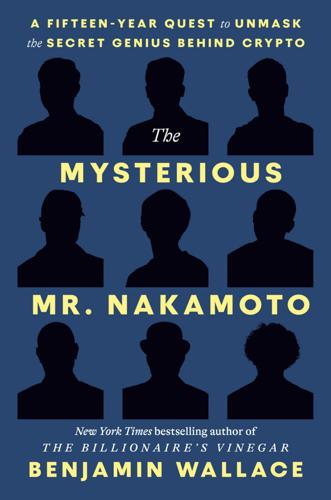
The Mysterious Mr. Nakamoto: A Fifteen-Year Quest to Unmask the Secret Genius Behind Crypto
by
Benjamin Wallace
Published 18 Mar 2025
The list of group interests was a syllabus for the future leaders of twenty-first-century Silicon Valley: life extension, space colonization, homeschooling, biohacking, consciousness-uploading, AI, self-sovereignty, seasteading, digital money, antistatism, transhumanism, polycentric law, prediction markets, digital nomads (their term was tech nomads), and memetics, among other things. A remarkable number of members were or would become influential. Nick Bostrom was the Oxford philosopher of the so-called simulation hypothesis—the improbably widely held belief, among Elon Musk and his peers, that we are all living in a videogame.
…
GO TO NOTE REFERENCE IN TEXT “network states”: Balaji Srinivasan, The Network State: How to Start a New Country (N.p.: Amazon Kindle, 2022). GO TO NOTE REFERENCE IN TEXT a “distributed,” blockchain-coordinated “city”: Danny Nelson, “Coliving Project Cabin Wants to Put Digital Nomads in Nature,” CoinDesk, May 23, 2023. GO TO NOTE REFERENCE IN TEXT signed up with Alcor when he was twenty: Andrew Fenton, “Roger Ver’s Next Life: Cryonics Meets Crypto,” Magazine by Cointelegraph, April 28, 2021. GO TO NOTE REFERENCE IN TEXT Vitalik Buterin had donated crypto to life extension organizations: Kelsie Nabben, “Crypto Leaders Are Obsessed with Life Extension.
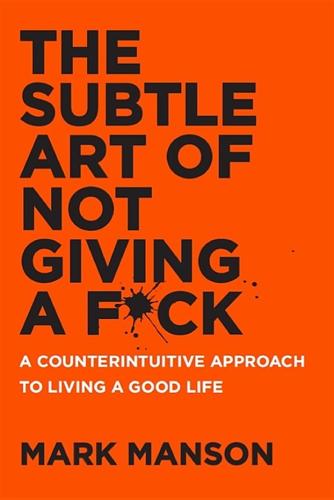
The Subtle Art of Not Giving a F*ck: A Counterintuitive Approach to Living a Good Life
by
Mark Manson
Published 12 Sep 2016
By this time my little dating advice blog was getting some traffic and I was actually making a modest amount of money selling PDFs and courses online. I planned on spending much of the next few years living abroad, experiencing new cultures, and taking advantage of the lower cost of living in a number of developing countries in Asia and Latin America to build my business further. It was the digital nomad dream and as a twenty-five-year-old adventure-seeker, it was exactly what I wanted out of life. But as sexy and heroic as my plan sounded, not all of the values driving me to this nomadic lifestyle were healthy ones. Sure, I had some admirable values going on—a thirst to see the world, a curiosity for people and culture, some old-fashioned adventure-seeking.
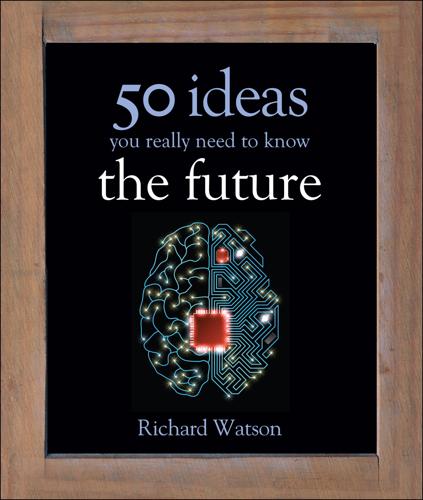
50 Future Ideas You Really Need to Know
by
Richard Watson
Published 5 Nov 2013
the condensed idea The rich will get richer timeline 2011 Occupy Wall Street protests about income distribution and fairness 2013 Stagnating incomes in West and North compared to East and South 2014 Hackers target payrolls of investment banks 2017 Muggings in Notting Hill known as “income tax” 2022 Maximum of 100:1 salary ratio widely adopted in Fortune 500 companies 2039 1 billion US dollar millionaires globally 2080 World’s first trillionaire 29 What (& where) is work? Do you remember work? I’m not insinuating that you don’t have a job, but am alluding instead to the idea that linear jobs, easily defined, often available for life and generally conducted from a bricks-and-mortar office or factory, have, in many instances, vanished. In their place we have digital nomads, juggling projects and feverishly scanning data from “hot desks” in coffee shops. Jana, previously called Txteagle, is the largest employer in Kenya, founded in 2008 by a computer engineer called Nathan Eagle. It has 10,000 workers in Kenya, but does not pay a penny for office space to house any of them.

Long Game: How Long-Term Thinker Shorthb
by
Dorie Clark
Published 14 Oct 2021
Every time, she’s learning and improving. And if something doesn’t quite work, it’s not the end of the world. Inspired by her experience learning to DJ, Petra decided to buck expectations and take another big chance two years later. She fulfilled a long-standing dream to spend a year traveling around the world while working as a “digital nomad.” Win—Even If You Lose Here’s the ultimate way to de-risk your 20% time: make sure that even if you lose, you still win. That was what Jonathan Brill did when he took on the World’s Fair project, knowing that regardless of the outcome, he’d build new skills and make valuable connections.
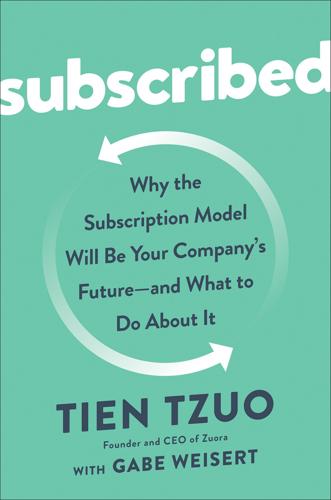
Subscribed: Why the Subscription Model Will Be Your Company's Future - and What to Do About It
by
Tien Tzuo
and
Gabe Weisert
Published 4 Jun 2018
Mobile workers and entrepreneurs are ditching coffee shops for shared workspaces. Every day, more than 1.2 million people go to an “office” that’s full of other freelancers or small corporate teams. People are finding all sorts of cool new getaway experiences on vacation rental sites like VRBO or digital nomad platforms like Roam. In response to Airbnb, hotel companies are realizing that they’re in the business of creating compelling travel experiences, not just putting their names on big resort properties, so they’re diversifying into apartment rental platforms. Subscription-based digital services are a big part of the business models powering these sites, whether you’re signing up directly with HomeAway or your real estate agent is taking advantage of a professional service on Zillow to reach more buyers.
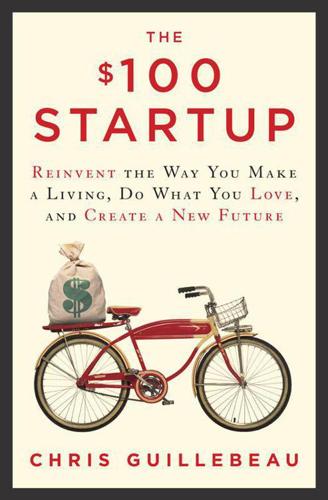
The $100 Startup: Reinvent the Way You Make a Living, Do What You Love, and Create a New Future
by
Chris Guillebeau
Published 7 May 2012
As you roam, maintain a balance between adventure and work. Remember that most people work regular jobs and travel only once in a while, so be sure to take advantage of sightseeing and experiencing the local culture. But similarly, don’t feel bad about needing to devote more hours to work whenever needed. It’s OK; the work allows you to travel. Digital nomads and roaming entrepreneurs come in all packages, and it’s hard to get away from their infectious stories. As I interviewed business owners and put the word out for more submissions, I kept hearing story after story that sounded like those of Brandon, Kyle, and Bernard. I’d continue to cast the net for more traditional businesses, but I kept thinking: This is a great business model.
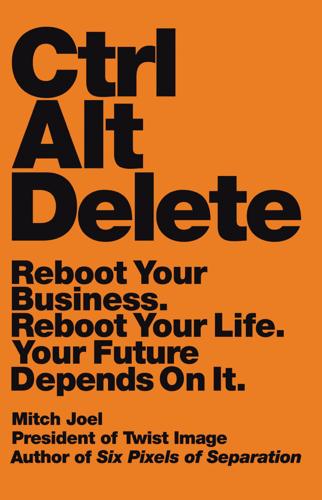
Ctrl Alt Delete: Reboot Your Business. Reboot Your Life. Your Future Depends on It.
by
Mitch Joel
Published 20 May 2013
We spent decades fighting for that corner office, and it now turns out that corner-office thinking is a thing of the past. The newer offices have a different guiding principle: Work space is less about how much square footage each office has and how spacious it is as we now move toward a modernized space—one that is much more flexible in terms of use and more actively in tune with the digital nomad that is the new employee and the “anywhere” work space. Your office, the Ace Hotel, the study in your home—your office is everywhere. LESSONS FROM WORKING THE NEW SPACE… Lesson #1—The digital office. This is a time of breaking the silos. More people are mobile, more people are untethered, and the most successful businesses are not just leveraging technology to make them better, they’re integrating technology into every single aspect of their operations.
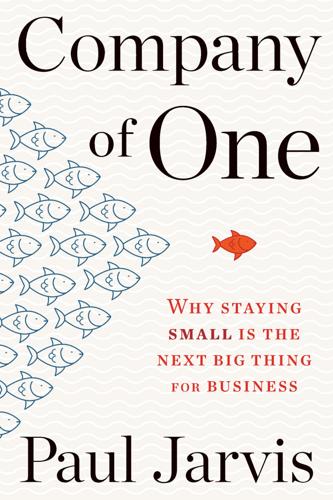
Company of One: Why Staying Small Is the Next Big Thing for Business
by
Paul Jarvis
Published 1 Jan 2019
The 15,000-square-foot WordPress office was being used by approximately five people a day; having 3,000 square feet to work in is definitely a bit too much space. Because technology makes it easy to work from anywhere, on any computer, less spending on overhead (like offices and the things that come with offices) is required. Pieter Levels is a digital nomad and Dutch programmer who is challenging the status quo of business tradition. Working from any location around the globe with an internet connection (currently in a village in Thailand), he builds software that competes with VC-funded Silicon Valley companies with teams of twenty or more people.
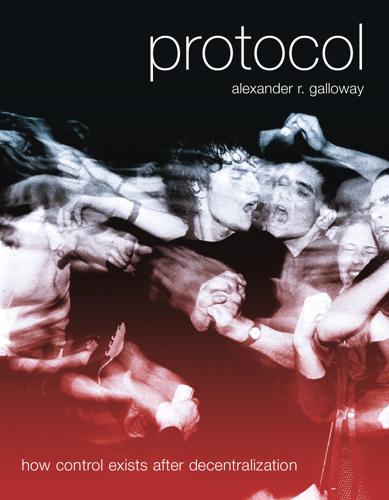
Protocol: how control exists after decentralization
by
Alexander R. Galloway
Published 1 Apr 2004
As a Web page _readme is nothing but links to other places; it is an aestheticization of protocol as such. In November 1998 at the Kunstlerhaus Bethanien in Berlin, Bunting created a very unique work of art for the “Net—Art—World: Reception Strategies and Problems” conference on net.art. Bunting had already gained a reputation in net.art circles as being somewhat aloof, a digital nomad who 28. See http://www.c3.hu/hyper3/form. Internet Art 225 reputedly owned no possessions except for a single set of clothes and a CDROM that hung on a chain around his neck. Rumors had also circulated that Bunting, dissatisfied with harassment from the Euro-American art clique, had turned to making works of cyberterrorism, funded exclusively by rogue nations.
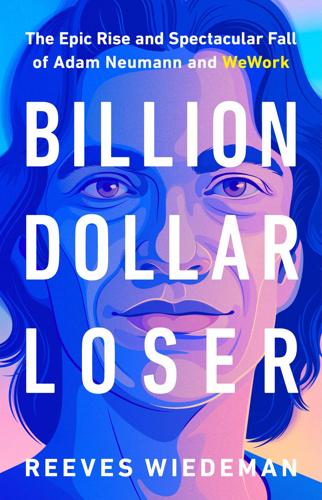
Billion Dollar Loser: The Epic Rise and Spectacular Fall of Adam Neumann and WeWork
by
Reeves Wiedeman
Published 19 Oct 2020
Adam and Artie had fought over what to do as they moved toward a potential public offering. Artie argued it was wise to rein in the company’s spending, shore up its finances, and prepare to go public. Managers were being asked to trim head counts and bring “discipline” to their spending. WeWork’s board rejected Adam’s attempt to buy Remote Year, a platform to help digital nomads find places to sleep and work around the world. The Creator Awards were shelved after one last show in Seoul, and Summer Camp 2019 was canceled. On April 1, WeWork got rid of the extravagant fees it had been paying to brokers; its battered rivals worried that the change might be an April Fools’ joke.

Filterworld: How Algorithms Flattened Culture
by
Kyle Chayka
Published 15 Jan 2024
Homes were selling for more than 20 percent over asking, according to one Realtor. It wasn’t just upstate New York; those suddenly able (and forced) to work at home could work from anywhere. The options included popular remote-work destinations like Mexico City, Lisbon, and Bali, which saw influxes of new long-term visitors. These were “digital nomads”—people who hold down lucrative remote jobs or freelance gigs while traveling, working from their laptops in picturesque, relatively affordable locations. This pandemic migration would have still happened without Airbnb, of course, but the platform accelerated and exacerbated it by making it so easy for a renter to find exactly the space they were looking for, and by motivating owners to put their homes on the marketplace to begin with.
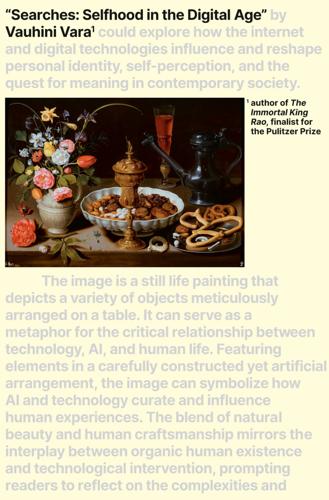
Searches: Selfhood in the Digital Age
by
Vauhini Vara
Published 8 Apr 2025
CNN, COVID-19, COVID-19: Health experts (India), COVID-19: Indian media & journalists, Caitlin Clark, California, California wildfires, Cambridge University, Cartoons, Catfish: The TV Show, Catherine Rampell, Cecilia Kang, Celebrities, Chandigarh, Charles Bukowski, ChatGPT, Cheese, China national news, Chrissy Teigen, Classic rock, Climate change, Coach, Coach Handbags, Wallets & Cases, Coffee, Colin Kaepernick, College Basketball, College life, College sports, Colorado, Colorado Avalanche, Colorado Buffaloes, Colorado Rapids, Colorado Rockies, Columbia University, Comedy TV, Commentary, Computer programming, Constitution of United States of America, Cornell University, Country music, Cowboy Carter, Credit Cards, Crime drama, Cuisines, Cult classics, Cultural events, Cultural history. Daisuke Wakabayashi, Dan Levy, Dana Rohrabacher, David Frum, Dawn Staley, Deepika Padukone, Delta Airlines, Denver Broncos, Denver Nuggets, Digital asset industry, Digital assets & cryptocurrency, Digital creators, Digital nomads, Diljit Dosanjh, Directors, producers & writers, Dogs, Dolly Parton, Donald Trump, Drama TV, Drinks, Dune. Ed Yong, Education, Education news and general info, Elizabeth Warren, Elon Musk, Empire, Entertainment, Entertainment franchises, Entertainment industry, Events, Evo Morales. Facebook, Family, Fashion, Fashion accessories, Fiction literature, Fields of study, Fighting games, Financial news, Financial services, Fitness, Folk & acoustic, Folklore, Food, Food experience, France politics, Freelance Writing, Fruits.
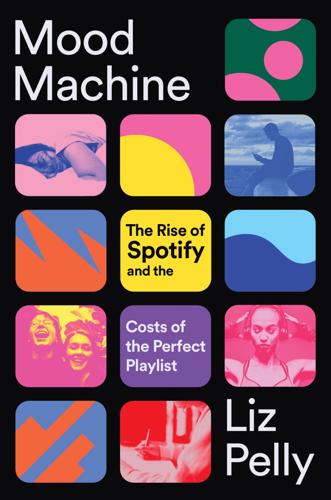
Mood Machine: The Rise of Spotify and the Costs of the Perfect Playlist
by
Liz Pelly
Published 7 Jan 2025
“What’s up guys…. Today I’m going to show you where I write my music, and a tour of the rest of my tiny house,” he said into the camera, before panning around his miniature dwelling, like the millennial cozy-vibes version of MTV Cribs. This was Spotify’s model artist: a solo creative entrepreneur, digital nomad, who posted as much about van life and his outdoorsy lifestyle as he did about his steady stream of singles and EPs. A cemented brand, cohesive storytelling, continuous engagement—when Daniel Ek talked about his ideal artist-entrepreneur, this was it. He was unsigned, but his management worked closely with “management services” company mTheory, which has maintained tight alliances with Spotify over the years.
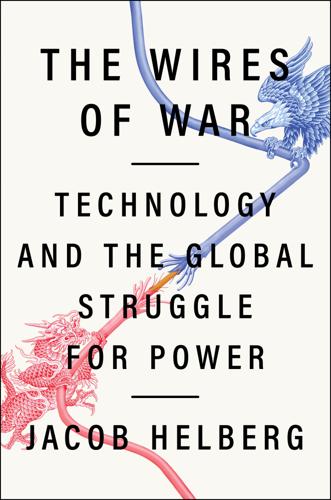
The Wires of War: Technology and the Global Struggle for Power
by
Jacob Helberg
Published 11 Oct 2021
Silicon Valley is suspicious of stability. Tech worships at the altar of growth—driven by Moore’s law, which states that computer processing power doubles roughly every two years. The idea of stagnating and sitting in the same place—of holding a position held by your family for decades before—is downright frightening to the impatient digital nomads of the West Coast. Naturally, these cultural differences manifest themselves in very different organizational structures. Washington often moves at a glacial pace, and it can take hours of congressional debate just to vote on an incremental legislative step. Members might spend decades waiting to move up in seniority.

Nomads: The Wanderers Who Shaped Our World
by
Anthony Sattin
Published 25 May 2022
Then he asked which nomads I was writing about and I replied, as I have done frequently, that what I am writing applies to all of them. Not literally, of course. But much of what I have written about the Xiongnu and the Mongols, the Lakota and the Aborigine also broadly applies to Tuareg and Inuit, to Beja and Bedouin, the Guaraní in Brazil and all the other nomadic peoples. It can also apply, in our own time, to some digital nomads, to travellers, wanderers, vagrants, the houseless and migrants, and it certainly applies to the Bakhtiari for they, like many others through the ages, have had to learn how to reconcile their mobile ways with the demands of the settled others, how to engage with towns and cities while living with and within the natural world.

Dark Laboratory: On Columbus, the Caribbean, and the Origins of the Climate Crisis
by
Tao Leigh. Goffe
Published 14 Mar 2025
The Caribbean is both a hub of globalization, tax shelters, and offshore banking and the logical endpoint for the fate and financing of the climate crisis. This is not only because oil has recently been found in Guyana. It should be no surprise that cryptocurrency clowns and conquistadors want to buy and settle on Caribbean islands as digital nomads. At tech conferences in Europe, these self-important venture capitalists have confessed to me that they seek a discovery like the thrill of the conquistador’s first step onto the gangplank bound for America, as bad as they know this was for the Native peoples. They pay upward of $50,000 USD for passports to buy vacation homes and claim tax benefits, whether or not they will get a tan or step foot on the island.
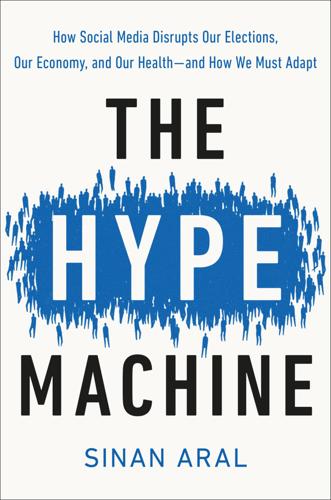
The Hype Machine: How Social Media Disrupts Our Elections, Our Economy, and Our Health--And How We Must Adapt
by
Sinan Aral
Published 14 Sep 2020
So the platforms have widely adopted hashtags as labels signifying topics. This takes the engineering burden off them and harnesses the crowd of users to label topics themselves. Hashtags are ubiquitous across social platforms today, but they were invented on Twitter over a decade ago. On August 23, 2007, Chris Messina, a Twitter user and self-described “digital nomad,” suggested adding a pound sign to keywords to make tweets on related topics easier to search. His original tweet asked, “How do you feel about using # (pound) for groups. As in #barcamp [msg]?” And the rest, as they say, is history. Twitter incorporated and began supporting hashtags in 2009 and launched trending topics, which measured and promoted trends, in 2010.
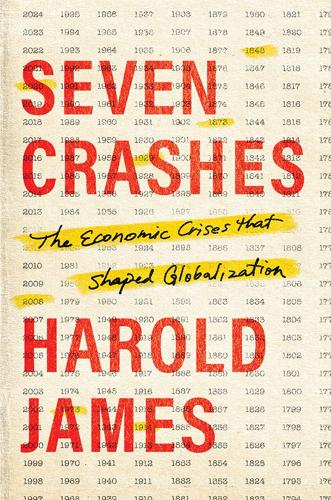
Seven Crashes: The Economic Crises That Shaped Globalization
by
Harold James
Published 15 Jan 2023
For health care, there were telemedicine and the application of AI to assess public-health challenges. Education and health care, if delivered digitally, could come from the opposite side of the world. For the care of the elderly, there was more discussion about how IT (and robots) might be used to help more people stay in their own homes. And for housing, new prospects opened up for digital nomads, who could work remotely from across the world. Technology, and globalization, in combination gave powerful answers, as they had in past crises. The lesson then was as simple as it is now: globalization improved lives. The combination of technical and geographic change always required competence, and that demanded adaptation and learning: looking to a future, by learning from a dismal past.
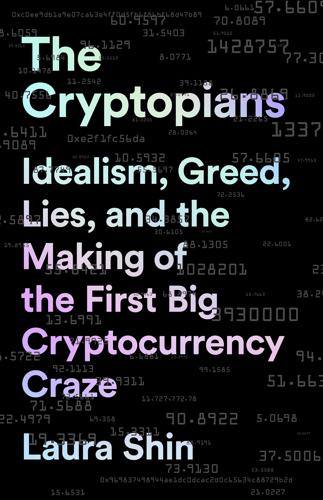
The Cryptopians: Idealism, Greed, Lies, and the Making of the First Big Cryptocurrency Craze
by
Laura Shin
Published 22 Feb 2022
Most newcomers were scammers, phishers, and “when-mooners,” or people who only cared about when Bitcoin was going to go “to the moon.” Basically, sharks were now circling the community, ready to snatch up any carelessly dropped private keys. One day the week before the ICO, in Singapore, where, being digital nomads, Jarrad and Carl happened to be at the time, Jarrad was writing a message warning people never to give away their private keys (because anyone asking for it was a phisher) when a console popped up on his screen showing “¯\_(ツ)_/¯.” His firewall app began spouting notifications about incoming connections.
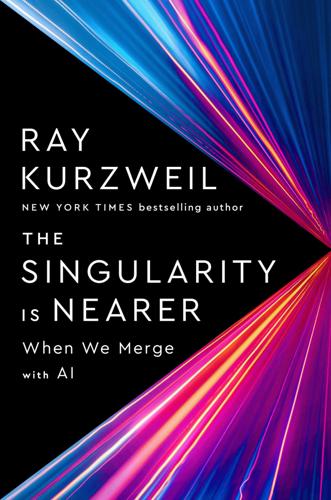
The Singularity Is Nearer: When We Merge with AI
by
Ray Kurzweil
Published 25 Jun 2024
BACK TO NOTE REFERENCE 9 Steven Pinker, Enlightenment Now: The Case for Reason, Science, Humanism, and Progress (New York: Penguin, 2018). BACK TO NOTE REFERENCE 10 Andrew Evans, “The First Thanksgiving Travel,” National Geographic, November 24, 2011, https://www.nationalgeographic.com/travel/digital-nomad/2011/11/24/the-first-thanksgiving-travel. BACK TO NOTE REFERENCE 11 Henry Fairlie, “Henry Fairlie on What Europeans Thought of Our Revolution,” New Republic, July 3, 2014, https://newrepublic.com/article/118527/american-revolution-what-did-europeans-think; Peter Stanford, “The Street of Ships in New York,” Boating 21, no. 1 (January 1967): 48, https://books.google.com/books?
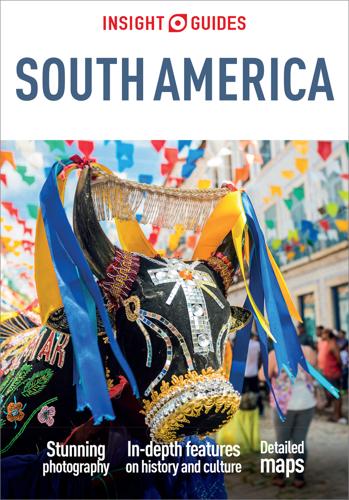
Insight Guides South America (Travel Guide eBook)
by
Insight Guides
Published 15 Dec 2022
Amazonas 4153 and Unión Nacional de Periodistas, 3rd Floor, Edificio Eurocenter, Quito, tel: 02-245 5499; www.canadainternational.gc.ca/ecuador-equateur. Entry Requirements and Customs Regulations Visas Visas are not required for citizens of a vast majority of countries for a stay of up to 90 days, with another 90 days easy to obtain. Longer stays would require applying for a visa before traveling; “digital nomad” work visas are being introduced. To enter the country, you will need a passport valid for 6 months, you may also be asked to show a return/onward flight ticket. Customs Duty-free allowances include 400 cigarettes, 500 grams of tobacco and 25 cigars, 3 liters of alcohol, and gifts and personal effects worth up to $500.

The 4-Hour Chef: The Simple Path to Cooking Like a Pro, Learning Anything, and Living the Good Life
by
Timothy Ferriss
Published 1 Jan 2012
Here’s what my language acquisition times looked like in order, using standardized testing for all but Chinese: Recall that, at age 15, I’d failed to learn enough Spanish to hold a basic conversation. Now people were lauding me for being “good at languages” or congratulating me on being “gifted.” It was hysterical. I just had a better instruction manual. In 2005, I traveled the world as a digital nomad, an experience later chronicled in The 4-Hour Workweek. I focused on language to conquer loneliness: Irish Gaelic, Norwegian, German, Spanish (including Lunfardo dialect in Argentina), anything I came into contact with. The refinement continued through 2010 and to the present. I’ve vetted the process on Turkish, Greek, Xhosa, and other languages over shorter 1–2-week periods.
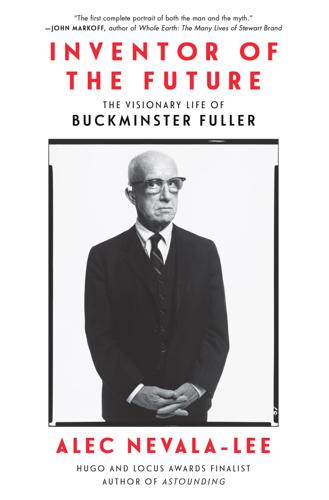
Inventor of the Future: The Visionary Life of Buckminster Fuller
by
Alec Nevala-Lee
Published 1 Aug 2022
Before they became part of our collective future, Fuller independently arrived at the principles of online education, remote working, and universal access to data, which he developed without any computers at all. On a more pragmatic level, Fuller used ephemeralization to sustain his virtual company, which he ran for years as a perpetual start-up. He made most of his money from lecturing, and, as the original digital nomad, he minimized his physical needs. The chord factors for an undergraduate dome project could fit on a page in his wallet, and he was capable of lecturing extemporaneously for hours using slides and a suitcase of visual aids. His models often drew on a principle that he called tensegrity, based on lightweight sculptures where the solid parts never touched, which Fuller utilized to further reduce the bulk of his mobile operation.

The Rough Guide to Brazil
by
Rough Guides
Published 22 Sep 2018
One of the best mid-range options on the beach, with good service and rooms with balcony, a/c, LCD TV and cable TV. R$242 Piratas da Praia Av Cons Aguiar 2034 (3rd floor), at Rua Prof. Osias Ribeiro 81 3326 1281, piratasdapraia.com; map. Neat pastel dorms with primary-coloured portraiture and some private rooms; all have fans and a/c. Co-working space for digital nomads (R$5/hr) and lockers available. Breakfast included. Dorms R$46, doubles R$106 Pousada Praia Boa Viagem Rua Petrolina 81 81 3039 5880, pousadapraiaboaviagem.com; map. A decent and more intimate option to the usual high-rise hotels in Boa Viagem, this pousada offers clean rooms with a/c, LCD TV and frigobar and 24hr reception.
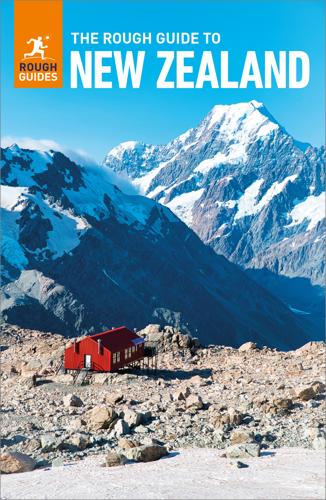
The Rough Guide to New Zealand: Travel Guide eBook
by
Rough Guides
Published 1 Jan 2024
Its western end centres on the prosperous and fast-growing port city of Tauranga and its beachside neighbour Mount Maunganui. These amorphous settlements essentially form a single small conurbation sprawled around the glittering tentacles of Tauranga Harbour. A combination of warm dry summers and mild winters initially attracted retirees, followed by home-based small businesses and then digital nomads. Both towns have a thriving restaurant and bar scene, and a fleet of boats helps you get out on the water to sail or swim with dolphins. On land, make for Tauranga’s modern art gallery, or head inland to picnic beside the swimming holes at McLaren Falls or paddle to see glowworms. With all this, it comes as no surprise that the area is a big draw for Kiwi summer holiday-makers.